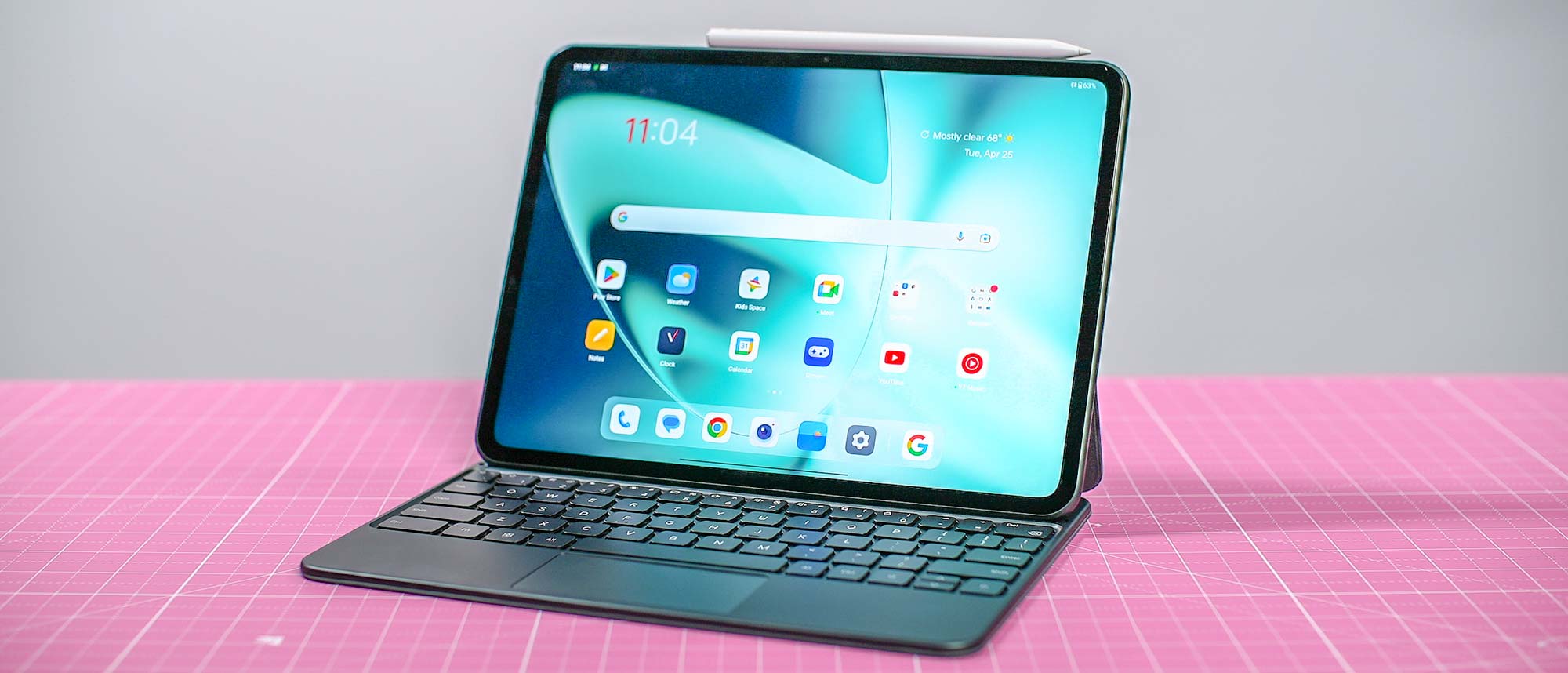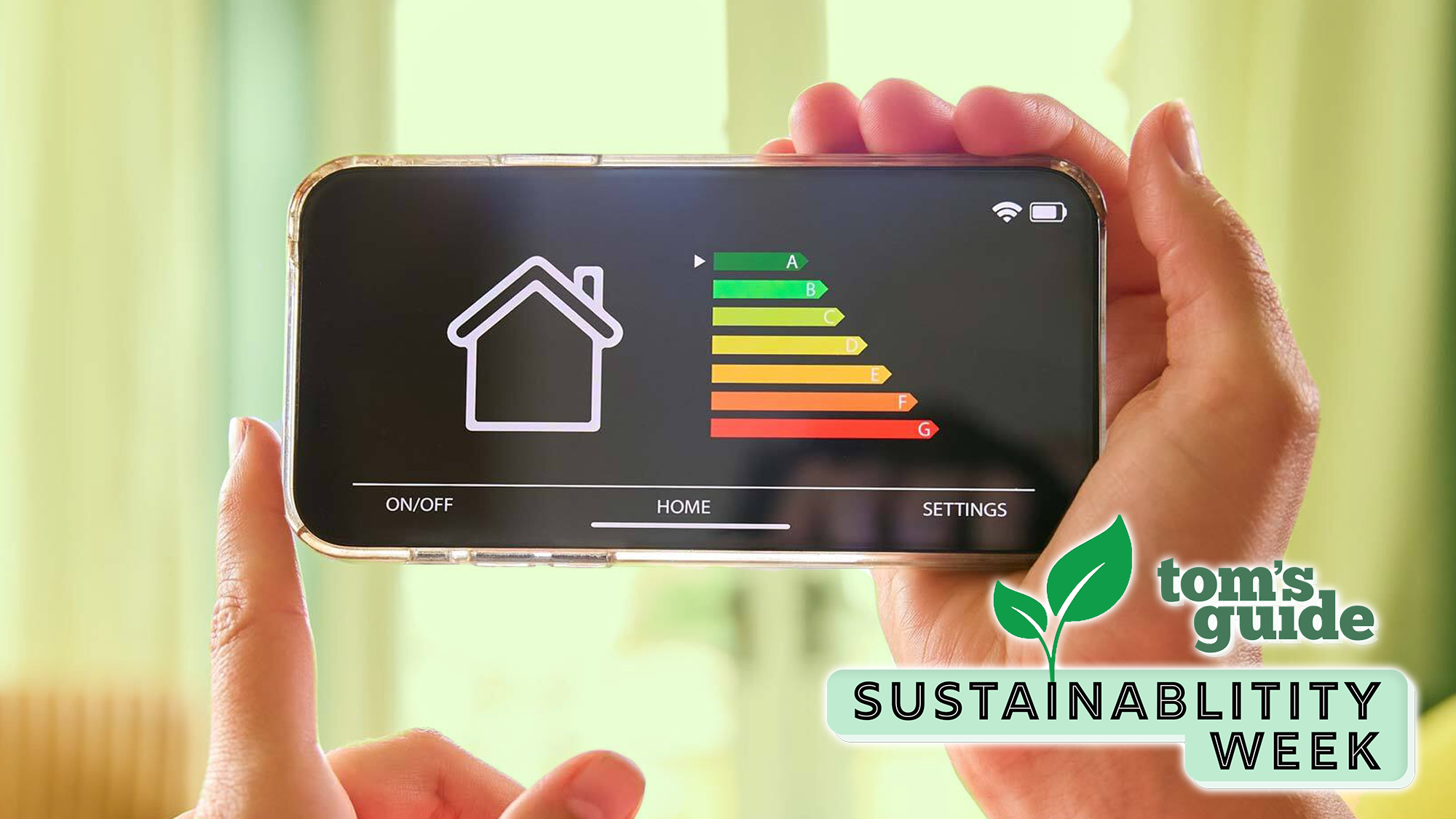Tom's Guide Verdict
The OnePlus Pad has a lot going for it. Its Dimensity 9000 CPU provides solid performance, and you get over 13 hours of battery life. Curved edges make it comfortable to hold for hours and its centered 13MP rear camera allows for easier photo snapping. The OnePlus Pad sets a new standard for Android tablets, especially at $479.
Pros
- +
Incredible battery life
- +
Comfortable curved edges
- +
Sharp front and rear cameras
- +
Fast performance
Cons
- -
Mediocre speaker quality
Why you can trust Tom's Guide
The OnePlus Pad ($479) is an Android tablet worth getting excited about. With a huge 13MP rear camera, curved edges and a unique 7:5 aspect ratio, OnePlus’ first slate stands out from the competition.
This tablet has plenty going for it besides its distinctive design. Videos and ebooks look great on its vivid 11.6-inch 144Hz display, and thanks to its MediaTek Dimensity 9000 CPU and Android 13 OS, apps and games run smooth and fast. The lightweight OnePlus Pad also has exceptional battery life, lasting over 13 hours in our testing.
The OnePlus Pad is one of the best Android tablets and overall best tablets out there. In my review, I’ll discuss what this slate has to offer and why it’s a worthy rival to the iPad 10th gen. Is the OnePlus Pad for you? Read on to find out.
OnePlus Pad review: Specs
| OnePlus Pad | |
|---|---|
| Price | $479 |
| Display | 11.6 inches (2800 x 2000) 7:5 aspect ratio, 144Hz |
| OS | Android 13 |
| CPU | MediaTek Dimensity 9000 |
| RAM | 8GB LPDDR5 |
| Storage | 128GB |
| Ports | USB-C |
| Cameras | 13MP (rear), 8MP (front) |
| Battery life | 13.5 hours (tested) |
| Size | 10.1 x 7.4 x 0.2 inches |
| Weight | 1.2 pounds |
OnePlus Pad review: Price and configuration
- Priced at $479
- Numerous accessories
The OnePlus Pad is available for purchase for $479 from OnePlus’ website. Amazon availability is expected in late May. The sole configuration features an 11.6-inch (2800 x 2000) 144Hz display, a MediaTek Dimensity 9000 CPU, 8GB of RAM and 128GB of storage.
A number of accessories are available for the OnePlus Pad. This includes the OnePlus Magnetic Keyboard ($39), OnePlus Stylo ($99), and OnePlus Folio Case ($39). You’ll get 50% off the OnePlus Bud Pro 2 if you pre-order the OnePlus Pad between April 28 and May 7. It's unclear if this offer extends beyond the pre-order window.
OnePlus Pad review: Design
- Curved edges
- Thin and lightweight
At a glance, the OnePlus Pad could be mistaken for an iPad. On closer inspection, its distinctive features become more apparent.
Unlike the flat-sided iPads and Galaxy Tabs, the OnePlus Pad has curved edges along its sides and bottom. This makes the tablet feel more ergonomic and comfortable to hold since it doesn’t have sharp edges digging into your palm. There’s a cutout with a flat edge on the top side (if holding the tablet in landscape mode) that’s perfectly sized to magnetically attach and charge the OnePlus stylus.
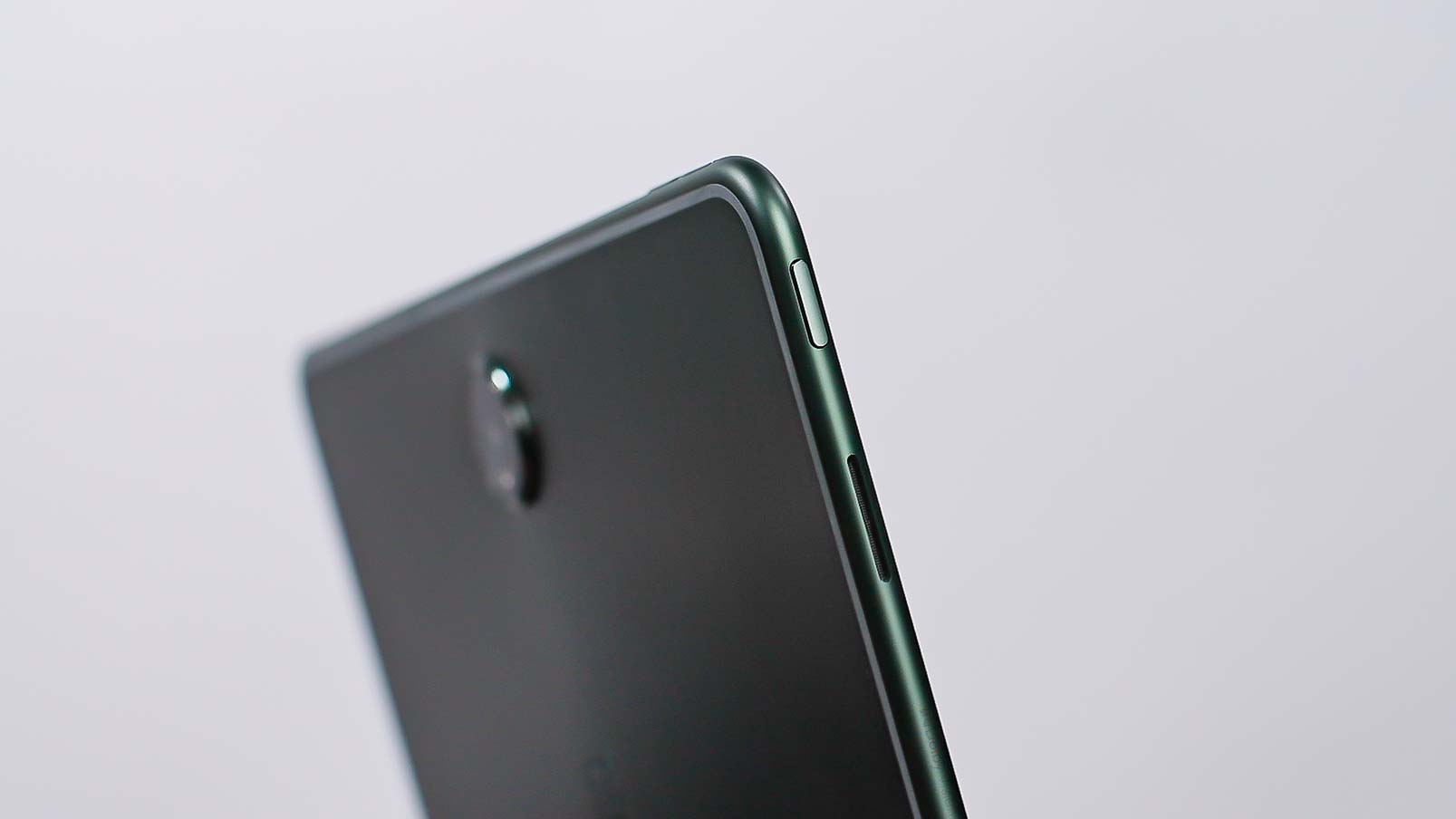
The enormous 13MP rear camera is one of this tablet’s signature design features. The camera is centered along the top edge of the tablet’s rear and is housed within an eye-catching black circle that sticks out both literally and figuratively. Because of that, it’s impossible for the tablet to lay flat on a surface. This isn’t an issue if you use the magnetic keyboard cover, however.
Measuring 10.1 x 7.4 x 0.2 inches and weighing 1.2 pounds without the cover, this elegant slab of machined aluminum is both thin and light. Even with the OnePlus Keyboard Cover adding additional weight and girth, the tablet feels extremely portable and easy to take with you wherever you go. The tablet only comes in Halo Green. Other color options would have been nice, but this shade of green is fetching.
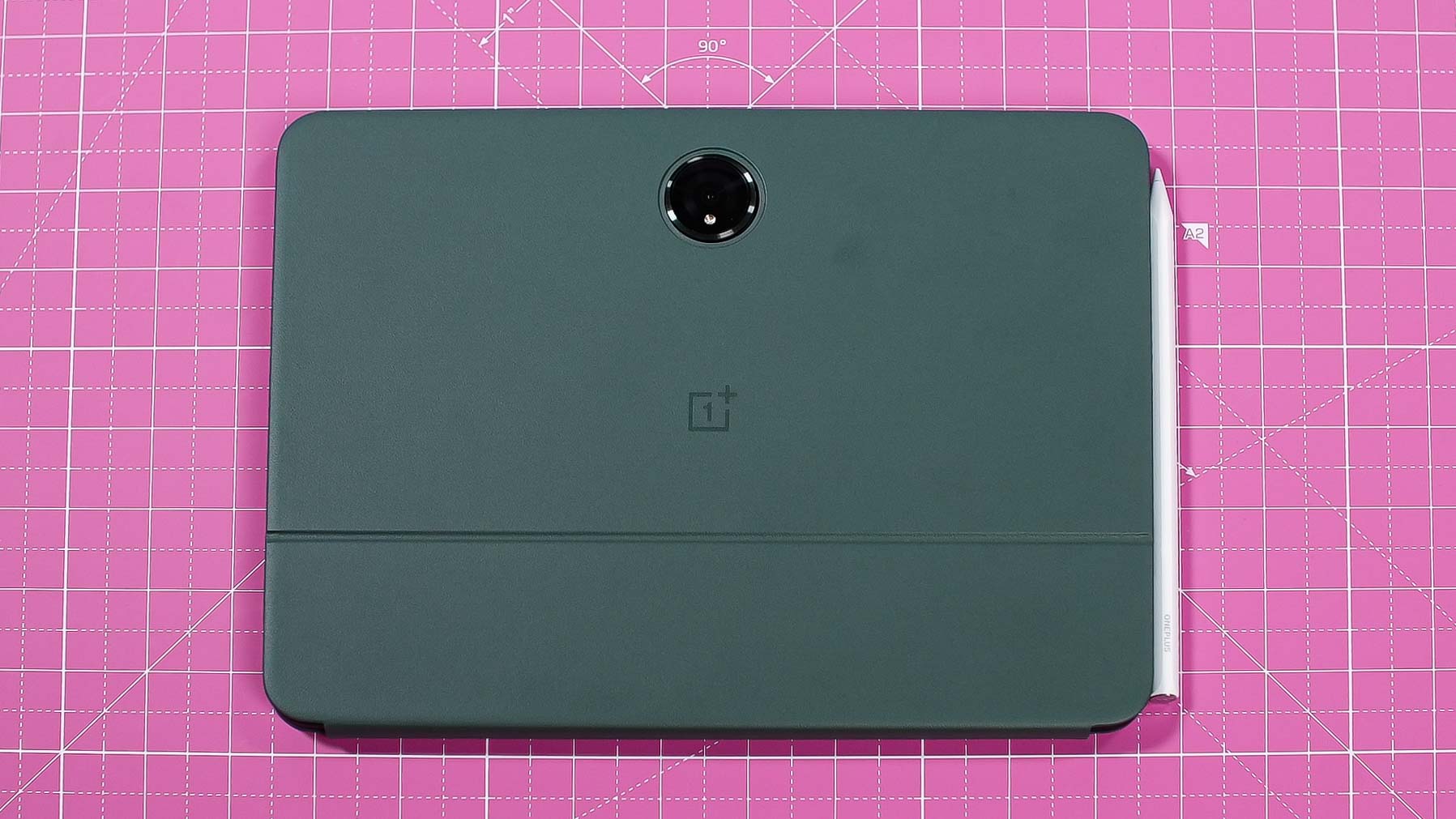
There’s a power button located on the left side of the OnePlus Pad, along with two volume buttons on the top. Quad speakers adorn the sides, and there’s a single USB-C port on the right side.
OnePlus Pad review: Display
- Unique 7:5 aspect ratio
- Bright and colorful
The OnePlus Pad’s 11.6-inch display has an unusual 7:5 aspect ratio. OnePlus says this aspect ratio will let you see more lines of an e-book and that more rows of a spreadsheet can be listed. In practice, I found that the 7:5 aspect ratio doesn’t make a meaningful difference when reading books or when looking at a spreadsheet.
Weird aspect ratio aside, the tablet has a great display that’s bright and colorful. I enjoyed watching videos like the latest Fast X trailer, which featured many exotic locales that look vivid and enticing on the OnePlus Pad. I could pick out minute details no matter how much over-the-top action was happening. Reading ebooks or digital comics was just as enjoyable thanks to the crisp 2,800 x 2,000 resolution.
| Header Cell - Column 0 | OnePlus Pad | Samsung Galaxy Tab S8 | iPad 10th gen |
|---|---|---|---|
| Nits (brightness) | 465 | 463 | 504 |
| sRGB | 111.7% | 101.8% | 101.2% |
| DCI-P3 | 79.1% | 71.6% | 71.7% |
| Delta-E | 0.25 | 0.25 | 0.21 |
Our tests back up my anecdotal experience. When we got the OnePlus Pad into our testing lab and pointed our instruments at it, we discovered the tablet’s panel achieves an average brightness of 465 nits, which is close to the advertised 500 nits. That’s comparable to the $699 Samsung Galaxy Tab S8 (463 nits) and just shy of the $449 iPad 10th gen (504 nits).
Like the Galaxy Tab S8, the OnePlus Pad has two color modes: Standard and Vivid. The former provides more natural tones, while the latter appears more vibrant. In Standard, the OnePlus Pad’s display covered 111.7% of the sRGB color gamut and 79.1% of the more demanding DCI-P3 color space (100% is most accurate). In Vivid mode, it achieved 159.5 % and 113.0 %, respectively. Neither mode affects brightness.
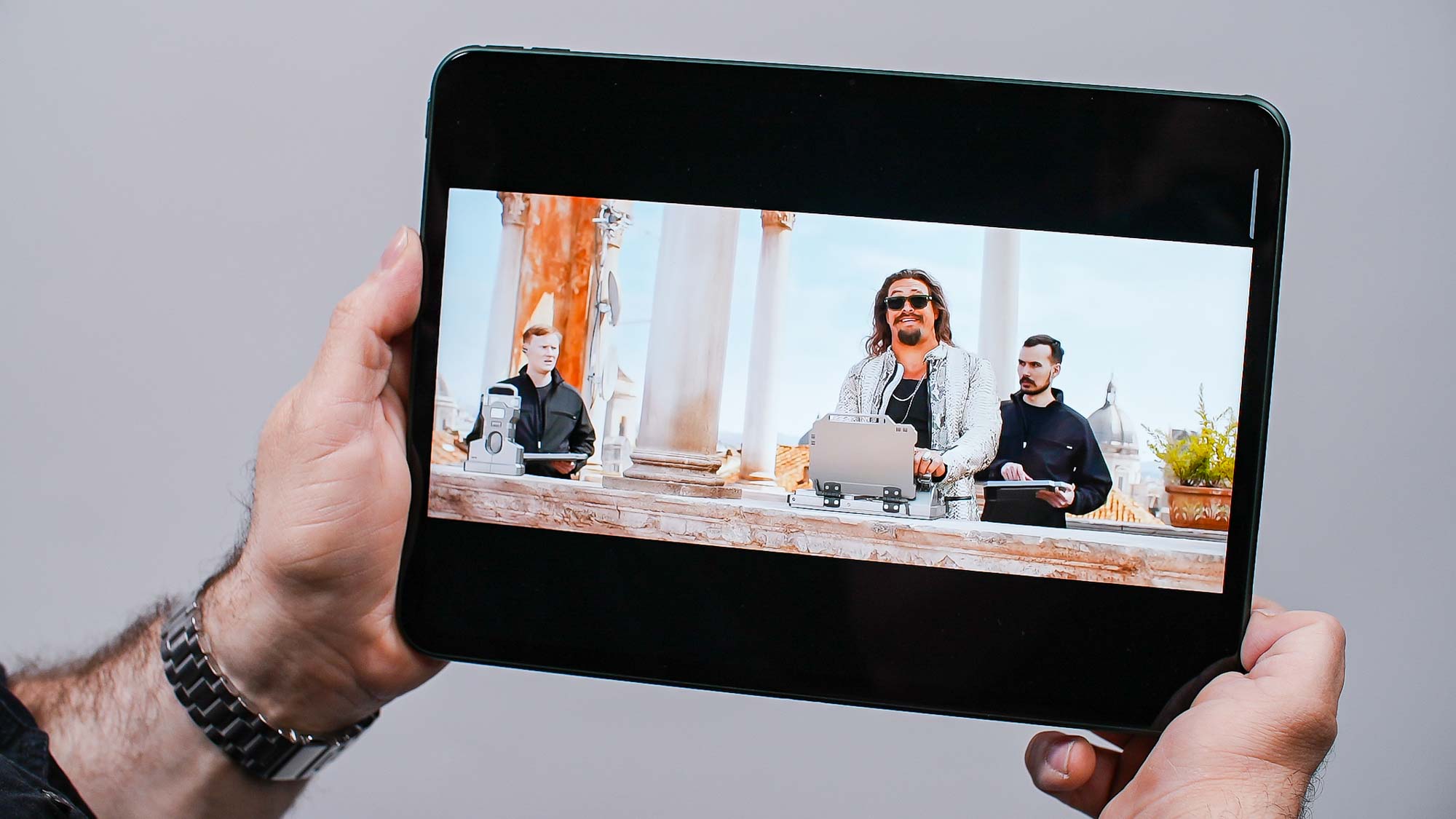
When we measured the Delta-E value of the screen, where lower numbers point to more color-accurate displays, the OnePlus Pad scored 0.25 and 0.29, respectively, in Standard and Vivid modes. The Tab S8 earned nearly the same scores for its Standard and Vivid modes (0.25, 0.31), though the iPad (0.21) performed slightly better than either Android tablet on this test.
The OnePlus Pad’s display is neck-and-neck with Samsung’s Galaxy Tab S8 in terms of color gamut, too. When we pointed our colorimeter at it back in 2022, the Tab S8's display achieved 101.1% of the sRGB color gamut and 71.6% of DCI-P3 in Natural mode and 157.8% sRGB/111.8% DCI-P3 in Vivid mode.
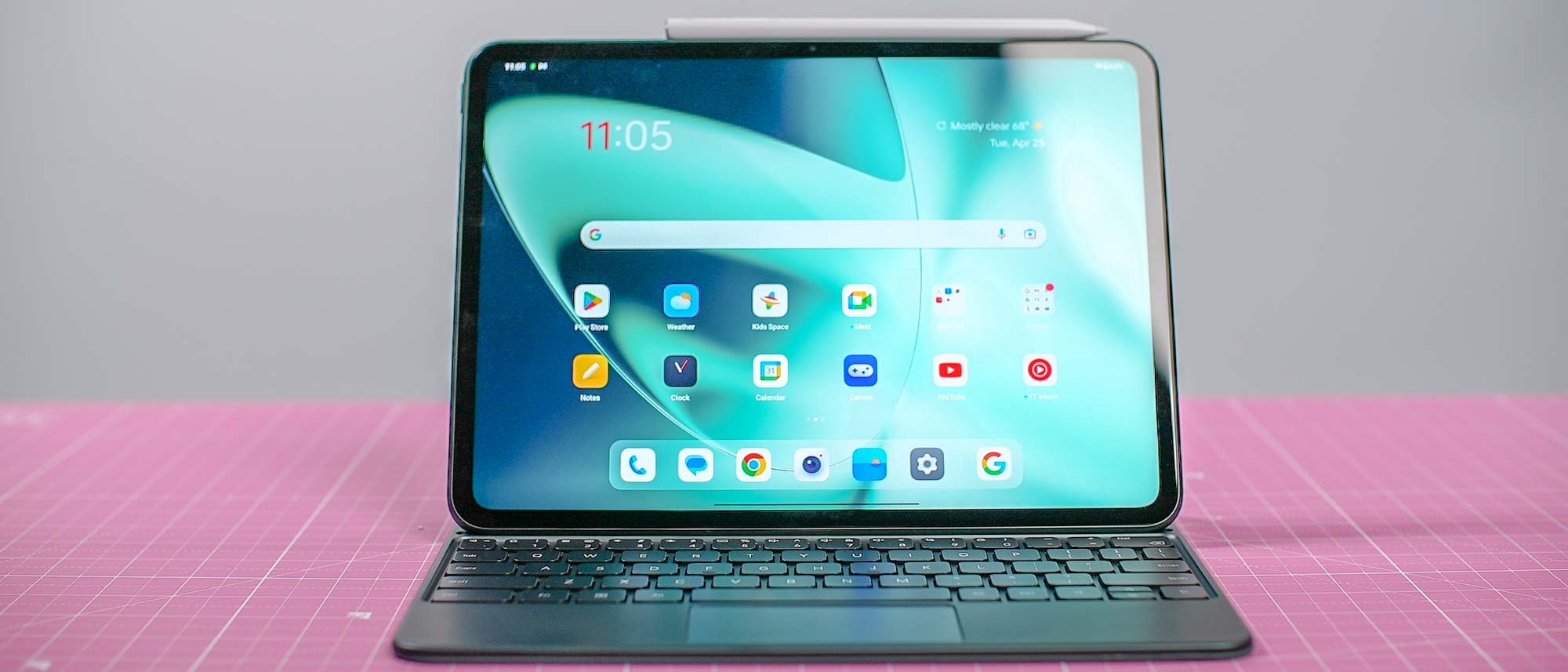
Thus our testing reveals that the OnePlus Pad can hold its own against Samsung’s entry-level flagship tablet. The same is true when compared to the iPad, which achieved 101.2% and 71.7%, respectively.
So which display mode is best? In practice, I switched between Standard and Vivid modes depending on whow I was using the tablet. For videos, I set it to Standard so I could get more natural colors. For comics, I bumped it to Vivid so that colors popped out more. Everything looked good regardless of which mode I selected.
OnePlus Pad review: Audio
- Clear, loud audio
- Good for videos, so-so for music
The OnePlus Pad’s four speakers delivered good sound when watching videos or listening to podcasts. Even with the volume cranked to max when watching the aforementioned Fast X video, everything came through crystal clear, with no distortion or other audio hiccups.
I fired up some of my favorite music tracks and got mixed results. While Iron Maiden’s “Aces High” sounded good, with clear distinction between the vocals and instruments at max volume, Symphony X’s “Nevermore” sounded like a garbled mess, even at medium volume. If you plan to listen to music on this tablet, I suggest connecting one of the best wireless earbuds.
OnePlus Pad review: Performance
- Fast Dimensity 9000 chip
- Strong performance
The MediaTek Dimensity 9000 chip powering the OnePlus Pad is fast. In fact, this is one of the fastest and most responsive Android tablets I’ve tested. Opening and closing apps, scrolling through web pages and playing games was a breeze.
Genshin Impact, which is a graphically-demanding game, ran wonderfully on the OnePlus Pad. Animations were fluid when fighting enemies and I barely noticed any stuttering when exploring the world.
| Header Cell - Column 0 | Single-core | Multi-core |
|---|---|---|
| OnePlus Pad | 853 | 3,275 |
| Samsung Galaxy Tab S8 | 1,208 | 3,228 |
| iPad 10th gen | 1,580 | 4,400 |
In the Geekbench 5 CPU benchmark test, which measures overall performance, the OnePlus Pad scored 853 on single-core and 3,275 on multi-core. While the Galaxy Tab S8 had better single-core performance (1,208), its multi-core score (3,228) is virtually identical. That said, the A14 Bionic chip-powered iPad 10th gen scored a much higher 1,580 / 4,400. The OnePlus Pad may lag behind the pack slightly in this test, but in my experience, it still feels plenty speedy to use.
| Header Cell - Column 0 | Wild Life Original Unlimited |
|---|---|
| OnePlus Pad | 8,793 / 52 fps |
| Samsung Galaxy Tab S8 | 9,549 / 57 fps |
| iPad 10th gen | 5,509 / 46 fps |
Graphics-wise, the OnePlus Pad scored 8,793 and hit 52 frames per second on the 3DMark Wild Life Original Unlimited test, which is designed to evaluate how well a device handles the graphically-intensive bursts of performance required by high-end mobile games. That’s better than the iPad, which scored 5,509 and hit 46 fps on the same test. The Galaxy Tab S8 fared better (9,549 and 57 fps) but it doesn’t completely trounce the OnePlus Pad.
| Header Cell - Column 0 | Time (seconds) |
|---|---|
| OnePlus Pad | 0:55 |
| Samsung Galaxy Tab S8 | 0:48 |
| iPad 10th gen | 0:29 |
In our video transcoding test in Adobe Premiere Rush, the OnePlus Pad finished the task in 55 seconds. The Galaxy Tab S8 (0:48) and especially the iPad (0:29) were much faster in this test.
OnePlus Pad review: Cameras
- Large 13MP rear camera
- Both front and rear cameras deliver sharp images
The OnePlus Pad’s huge 13MP camera centered along the top rear of the tablet is an eye-catching design choice, but it isn’t just for show – it also snaps great photos.
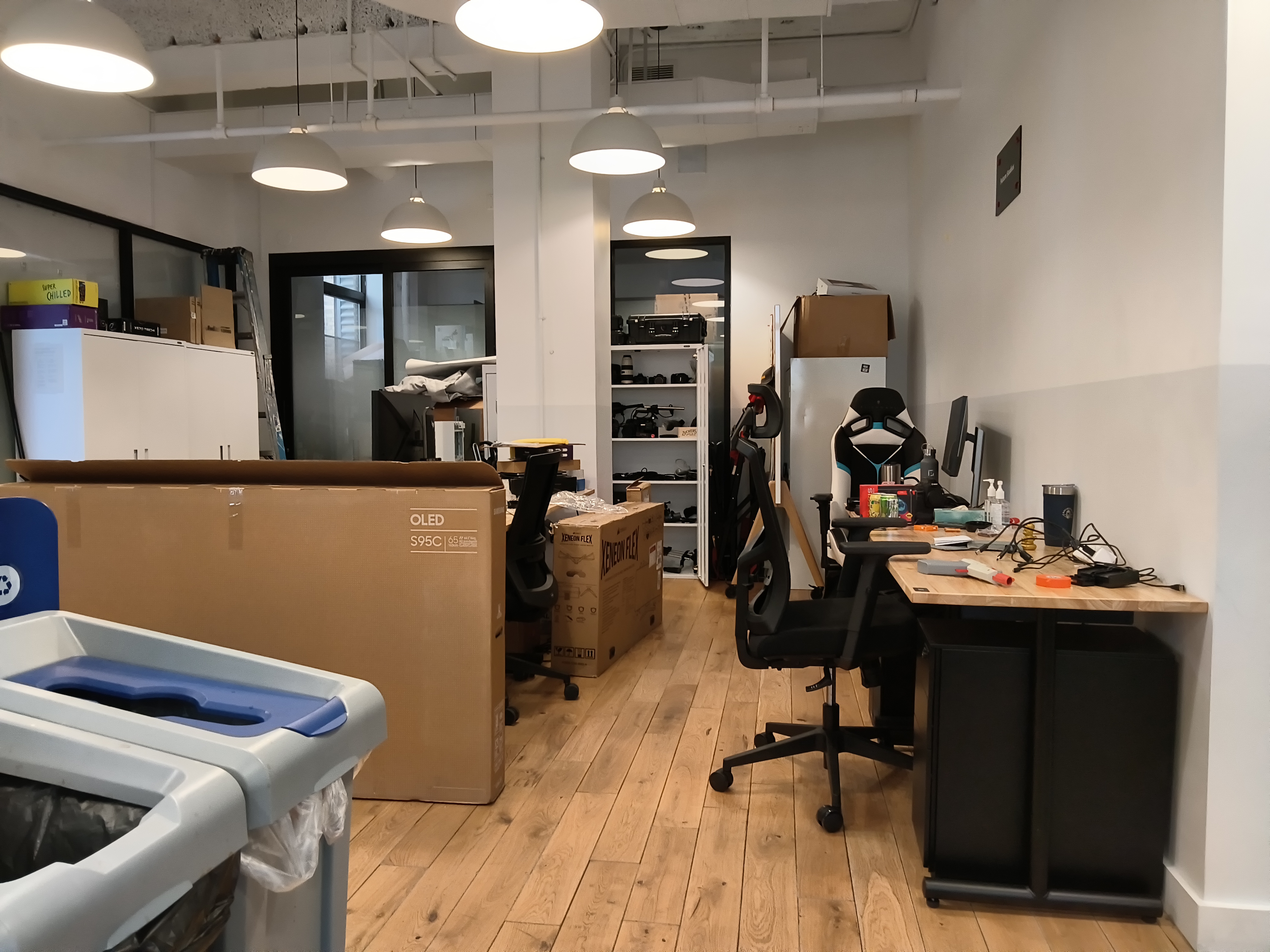
As you can see in the photo above, all the items in the image are clearly visible and distinct. The image is sharp, bright and has solid color accuracy. The placement of the camera also makes the OnePlus Pad easier to shoot photos with than most tablets, which typically have rear cameras mounted in a corner instead.

The front-facing 8MP camera is also solid. The camera does an excellent job of capturing my skin tone and the details on my clothing. As you can see, it also accurately captures what’s in the background. If you plan to use the OnePlus Pad for video calls, you won’t be disappointed with how you appear to others.
OnePlus Pad review: Battery life and charging
- Long-lasting battery
- Fast charging
The OnePlus Pad’s battery is good enough to last you well over a day, meaning you won’t face an emergency if you forget the included 67W charger at home.
On the Tom’s Guide battery test, which involves continuous web surfing via Wi-Fi at 150 nits of screen brightness, the OnePlus Pad lasted an excellent 13 hours and 31 minutes. That’s longer than both the Galaxy Tab S8 (12:59) and iPad (10:57) lasted in the same test.
| Header Cell - Column 0 | Time (hours:mins) |
|---|---|
| OnePlus Pad 10th gen | 13:31 |
| Samsung Galaxy Tab S8 | 12:59 |
| iPad 10th gen | 10:57 |
Charging times are impressive. In our testing, it took 15 minutes to charge the OnePlus Pad to 25% and 30 minutes to reach 41% battery capacity. That’s comparable to the Tab S8, which took 30 mins to reach 45% capacity but better than the iPad 10th gen, which reached 26% battery capacity in 30 minutes.
OnePlus Pad review: Software
- Android 13 comes pre-installed
The OnePlus Pad comes with Android 13 pre-installed. As we said in our review, this update of the OS focuses more on stability and privacy instead of sweeping changes like Android 12 did. Despite that, it’s a solid update for Android tablets and the best Android phones.
While Android 13 might not be revolutionary, I found it noticeably faster than Android 12. One of my complaints about the operating system is that it can feel sluggish compared to iPadOS. That wasn’t the case here, thankfully.
OnePlus Pad review: OnePlus Magnetic Keyboard and Stylo
- Magnetic Keyboard is decent for typing
- Stylo is comparable to Apple Pencil
The OnePlus Magnetic Keyboard ($39) and OnePlus Stylo ($99) are two useful accessories for the OnePlus Pad. They are sold separately, but for a limited time you can get either the Magnetic Keyboard or Stylo for free by pre-ordering the tablet.
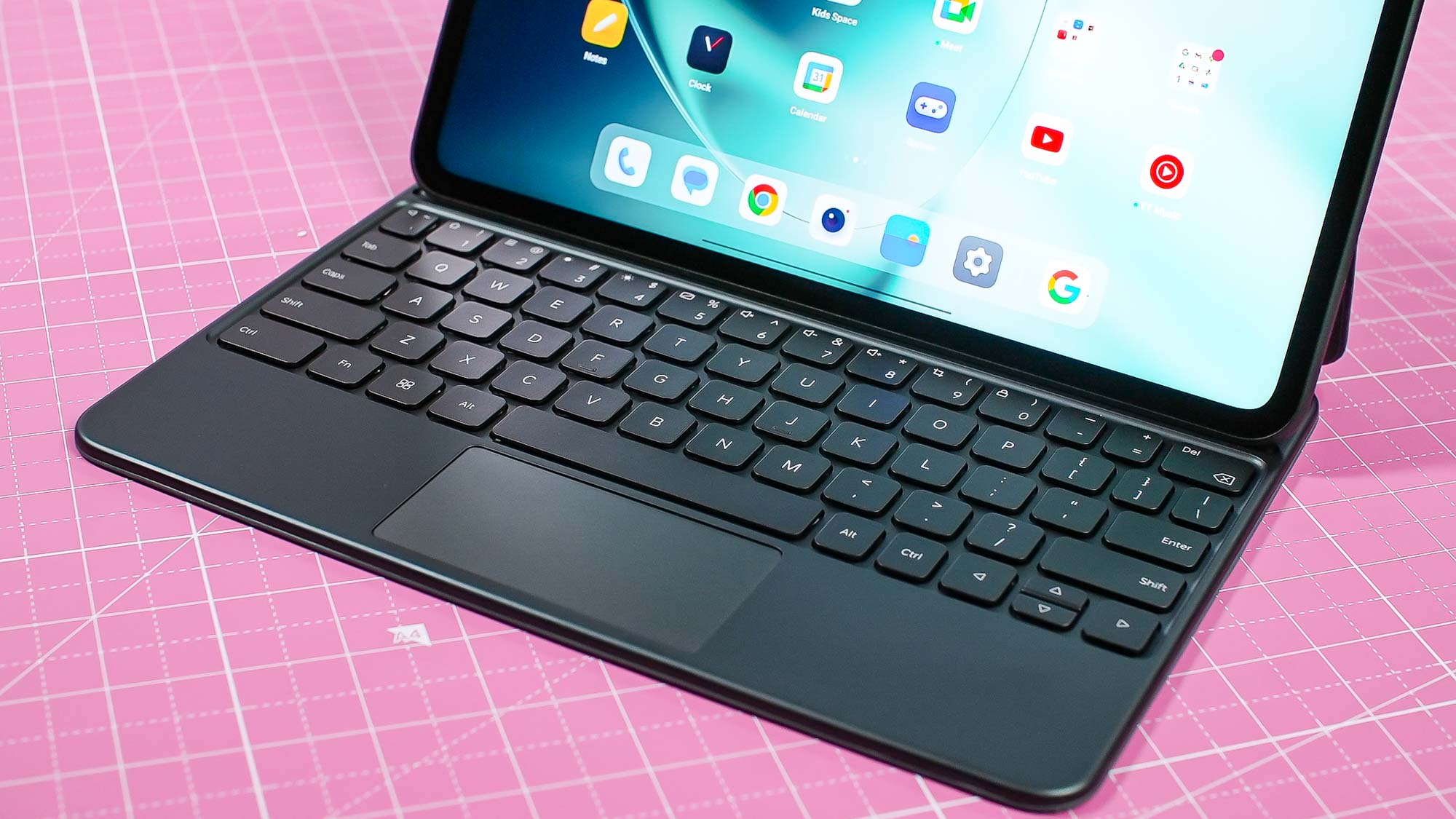
The keyboard feels solid and has a sturdy base to place the tablet on. No matter how fast I typed, the tablet stayed in place. But while this accessory is good to type on in a pinch, it might be too small for folks like me who have big hands. I couldn’t type for too long before my hands got cramped. If the keyboard’s size isn’t an issue for you, you’ll find the keys provide decent resistance when pressed. They also have satisfying travel distance. The touchpad is small but smooth and responsive.
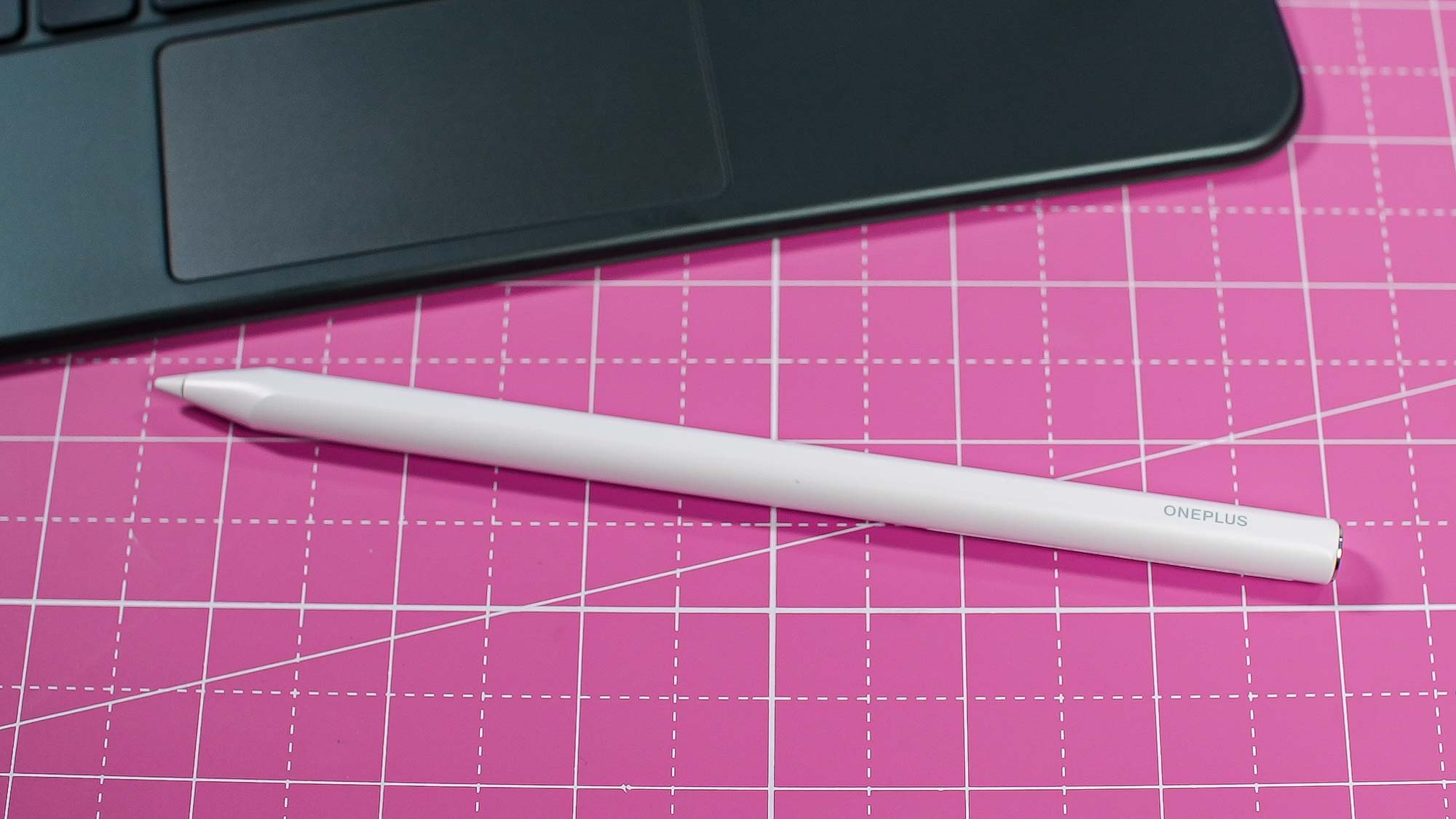
The OnePlus Stylo is now one of my favorite Apple Pencil alternatives. The stylus is sturdy and has a good amount of weight. It also has a thick tip, unlike the Samsung S Pen. And in contrast to the iPad 10th gen, you can recharge the pen by snapping it to the flat top portion. No separate USB-C adapter required! The Stylo is a great pencil that's fine to use.
OnePlus Pad review: Verdict
The OnePlus Pad not only has a signature style that distinguishes it from other Android tablets, but it also offers rock-solid performance and excellent battery life. Best of all, it only costs $479 dollars, over $200 less than Samsung’s competing Galaxy Tab S8. The only gripe I have is that the OnePlus Pad isn’t great for listening to music. Other than that, there’s little to complain about with this device.
If the OnePlus Pad doesn’t seem interesting, the slightly cheaper iPad 10th gen is a good alternative — especially if you like Apple. The iPad Air is a better option, though it starts at $599. The Samsung Galaxy Tab S8 is also good if you’re into that company’s ecosystem, though if you can’t get a trade-in discount the Tab S8 starts at a much pricier $699. However, if you’re looking for an excellent Android tablet for under $500, you can’t go wrong with the OnePlus Pad.

Tony is a computing writer at Tom’s Guide covering laptops, tablets, Windows, and iOS. During his off-hours, Tony enjoys reading comic books, playing video games, reading speculative fiction novels, and spending too much time on X/Twitter. His non-nerdy pursuits involve attending Hard Rock/Heavy Metal concerts and going to NYC bars with friends and colleagues. His work has appeared in publications such as Laptop Mag, PC Mag, and various independent gaming sites.
